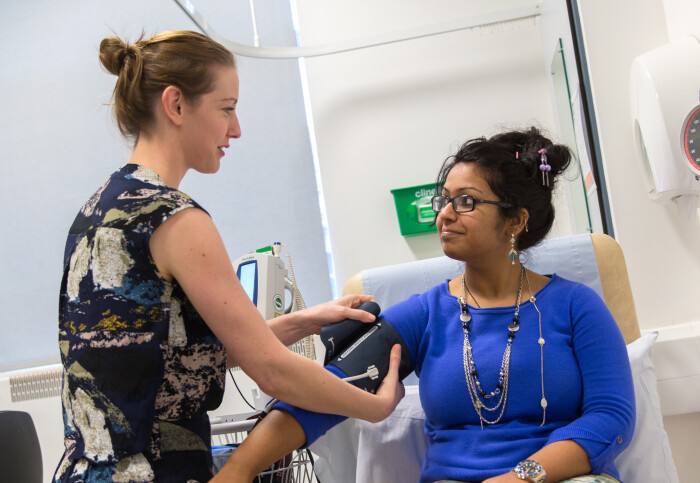AI model can predict high blood pressure and related complications from ECGs

An artificial intelligence (AI) model can predict the risk of high blood pressure and potential complications using an electrocardiogram (ECG).
The team, from the National Heart and Lung Institute (NHLI) at Imperial and Imperial College Healthcare NHS Trust, believe their work could help treat patients earlier, reduce the risk of complications or even mean some patients could implement simple changes to their lifestyle that help remove the risk of high blood pressure completely.
Researchers will be testing the AI technology with NHS patients this year in clinical trials at Imperial College Healthcare NHS Trust hospitals, which are supported by the National Institute for Health Research (NIHR) Imperial Biomedical Research Centre (BRC).
Lead researcher, Dr Arunashis Sau, a cardiology specialist registrar and Academic Clinical Lecturer at the NHLI and cardiology specialist registrar says the system could be used to help doctors identify patients who need to make changes in their lifestyle much earlier. “One of the most effective ways to manage high blood pressure, alongside medication, is through simple changes such as eating a more balanced diet with less salt and increasing exercise. If we can use AI to identify those patients at highest risk of high blood pressure, we can help motivate patients to make the right lifestyle changes to potentially prevent it from happening.”
High blood pressure, also known as hypertension, is very common, especially in older adults. People who have high blood pressure for a long time can experience damage to their blood vessels and heart which can lead to complications and more serious conditions such as strokes or heart attacks.
An ECG records the electrical activity of the heart and is one of the most common medical tests in the world. Patients with high blood pressure often undergo an ECG as part of their routine care to determine if there are any signs of damage to their heart.
ECGs show the flow of different electrical signals within and between the different chambers of the heart – the atria and ventricles. This AI model can read that information and see patterns in the electrical signals.
For the study, published in JAMA Cardiology, the research team used large sets of data consisting of more than one million ECGs previously taken as part of routine care to train their AI model to be able to accurately identify which patients went on to develop high blood pressure or related complications.
Patients were split into risk groups, with the highest risk group being found to have a four times higher chance of developing high blood pressure than those patients in the lowest risk quartile. The team also found that the system could accurately predict which patients went on to experience a stroke, heart attack or even patients who died by simply using a score generated by the AI system that was independent of other clinical risk factors.
Joint first author, Dr Joseph Barker, Clinical Research Fellow at the NHLI and a cardiology specialist registrar at Imperial College Healthcare said. “Identifying which patients are at highest risk of strokes and heart attacks could help doctors provide more intensive treatment to lower these risks”.
The research team have recently demonstrated two other models developed with a similar approach – one which looked at how the model could predict health risks more generally and the other used it to predict the risk of developing diabetes. They say that the AI system can see and understand complex and subtle ECG patterns better than a cardiologist can.
Senior author, Dr Fu Siong Ng, Reader in Cardiac Electrophysiology at the NHLI and consultant cardiologist at Imperial College Healthcare and will also be leading development of clinical trials at Imperial College Healthcare and Chelsea and Westminister NHS Foundation Trust this year. He said, “This work continues to show that our AI tool is credible and reliable at predicting important health risks, our trials will help show if patients can benefit significantly from earlier intervention and treatment.
“We will be working closely with patients who have all different kinds of health experience in the coming months to ensure our clinical trials are well-designed and help us to fully understand how this AI technology can improve outcomes for many of our patients.”
AI-enhanced ECGs are already known to be highly accurate in diagnosing heart diseases but have not previously been used to tell clinicians about an individual patient’s risk of developing diseases in the future. They are not currently part of routine hospital care or diagnosis.
The clinical trials will focus on evaluating the benefits of implementing the model with real patients and will start by mid-2025. Patients will be recruited from outpatient clinics and also from the inpatient medical wards.
The research was funded by the British Heart Foundation, via a BHF Clinical Research Training Fellowship to Dr Sau, another BHF Clinical Research Training Fellowship to Dr Barker, a BHF Programme Grant to Dr Fu Siong Ng, and the BHF Centre of Research Excellence at Imperial. The researchers also received support from the NIHR Imperial BRC, a translational research partnership between Imperial College Healthcare NHS Trust and Imperial College London, which was awarded £95m in 2022 to continue developing new experimental treatments and diagnostics for patients.
Content for this article was based on a news piece published on Imperial College Healthcare NHS Trust's website.
Article text (excluding photos or graphics) © Imperial College London.
Photos and graphics subject to third party copyright used with permission or © Imperial College London.
Reporter
Emily Medcalf
National Heart & Lung Institute
Samantha Rey
Communications Division